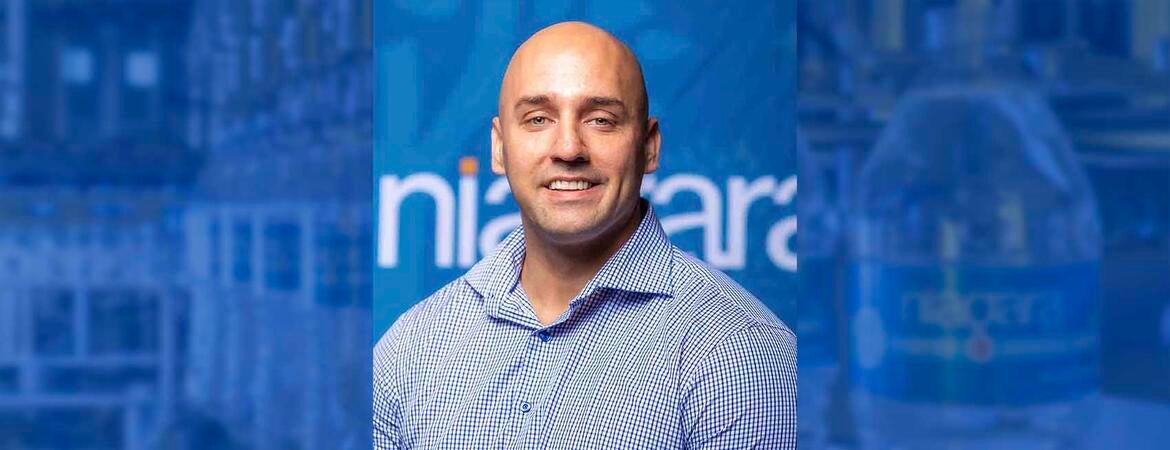
Having worked in several roles for Niagara Bottling, Michael King is now a supply chain planning manager at the company. “One of the things that I always tell my team is, ‘In order for you to be the best at your job, you need to understand how your role impacts other teams and how their roles impact you,’” he says. “Knowing this will make you good at what you do.”
King joined Niagara in 2017, and he’s had a number of previous positions there—finished goods planner, raw material planner and raw material buyer, and project manager—which exposed him to the many facets of the operation. Niagara Bottling is the largest family-owned-and-operated bottled water company in the United States with more than 45 locations supplying major retailers in North America.
“In my current role, I work cross-functionally with all the teams, from procurement and operations to planning and continuous improvement,” says King, who leads a team of five or six planners and oversees nine manufacturing plants with 25 to 35 production lines.
“The role is tactical and strategic. Tactically, you have to be able to make data-driven decisions for your region when you see supply shortages, which can be driven by multiple things—for example, manufacturing delays, carrier delays, raw material issues,” says King, who underscores the COVID-19 pandemic’s continued effect on supply shortages.
“The strategic side of my role is having the ability to hit key performance indicators. We have strategic goals that are driven by service plans. I must lead the team to make sure they have the right tools and training to meet these targets.”
As an example, he says, a strategic goal is to maintain product availability at a 96% service level: “We need to be able to do root cause analysis, if it’s not already done, and that means having the ability to data mine and draw conclusions from it. This is a skill students will need to learn in this industry.”
The Expanding Supply Chain Industry
“Supply chain is not going anywhere, and the industry’s growing larger and larger,” says King, who recently participated as a panelist for a UCR School of Business virtual roundtable with alumni and students interested in supply chain careers.
As more commodities and products are outsourced, this requires a sustained supply chain to meet ever-increasing demand, adds King, which translates to fruitful career opportunities. “As we know, e-commerce is also growing larger and larger every year, which implies a larger supply chain,” he says. “As our technology continues to improve, our supply chain will improve with it.”
“I work in the beverage sector of supply chain, and the area is growing significantly. As the culture in the beverage industry is becoming more ‘healthy’—including drinks with less sugar—we must make sure we can fulfill the demand,” he says. “This means changing business models to meet the demand. There is a lot of quick movement to capture the market share, and we need to be able to adapt swiftly.
“If you like a fast pace and solving problems, I recommend this industry.”
During the panel discussion with students, King emphasized the importance of having both hard and soft skills in the workplace: “I can teach anyone a hard skill, such as using Excel or putting a pivot table together. This is all very teachable.” But soft skills, such as improving communication skills, are harder to teach. “These take time and practice, and cannot be implemented as a standard operating procedure,” he adds. “During college, students should be working on their soft skills as much as possible.”
King’s Journey to a Career
Considering how much King obviously enjoys his career, his path to a college education and discovery of supply chain management as a vocation was circuitous.
In 2003, he joined the U.S. Navy and rose to the rank of quarter master. He was deployed to Kuwait during Operation Iraqi Freedom and worked with aircraft. “I saw some amazing things during the time I served,” he says. “While I was in the military, I did not honestly see myself ever going to college. If someone had told me my life plan included a bachelor’s degree and an MBA, I would have laughed. College was not the ‘norm’ for my family and not encouraged.”
When he left the Navy in 2007, he says, “I worked labor-intensive jobs, changing oil for cars, building motor homes, painting, injection molding. But, I’ve always been a numbers guy and loved mathematics, and I am a problem-solver in general. I realized I could offer a lot more in life.”
He enrolled in Riverside Community College and earned an associate degree while working two jobs. “I thought, ‘Why not get a bachelor’s degree? So, I pushed myself through.”
He chose UC Riverside’s School of Business because it’s in his hometown and he liked what he saw in the economics department. While earning his undergraduate degree, a macro and micro economics course sparked his interest in supply chain and pushed him toward his next step: “Going to graduate school was very important to me because I wanted to prove to myself that I could do it.”
Initially, he had designs on earning a Ph.D., but an eye-opening conversation with a professor who knew how passionate King was about supply chain management changed his trajectory. “I did not like writing research papers, and the professor said: ‘Why spend five years in grad school when you can get an MBA in two years and do exactly what you are passionate about?’ That made sense to me, and an MBA was the degree for me.”
During his career in higher education, King also was a teaching assistant for three quarters and worked a full-time job, and sometimes two jobs, the entire time. “I learned a lot about myself and my ability to handle a heavy workload and maintain a 3.5 GPA,” he says.
“I am the only one in my family who has obtained a college degree, and I’m hoping to change that cycle,” says King. He is married to Rosa Gallardo, and they have a girl and two boys. “I want my kids to know it’s not just about the major you study, but it’s also being able to commit yourself and challenge yourself mentally and, at times, physically. Receiving the degree is the reward.”
